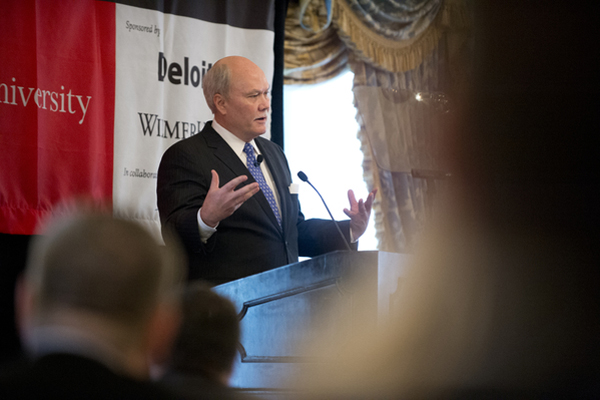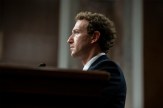Consumer is king, says Bacardi CEO

Edward Shirley is the president and CEO of Bacardi Limited, the world’s largest privately owned spirits company. But when it comes to his building upon the family-owned company’s more than 150 years of success, he knows who’s the boss.
“The consumer should be the single center of our focus,” said Shirley, who joined Bacardi two years ago after a 33-year career at the Gillette Company and Procter & Gamble Co. “Whether it’s razor blades or rum, success is about meeting and exceeding the expectations of the consumer.”
Shirley discussed the principles of good business as the keynote speaker on Wednesday at Northeastern University’s CEO Breakfast Forum. President Joseph E. Aoun hosts the series, in which leading CEOs share their expertise with audiences of other CEOs and senior executives from the Greater Boston area.
In his opening remarks, Aoun cited family-owned businesses as central to the U.S. economy’s growth, noting the research being conducted at Northeastern’s Center for Family Business in the D’Amore-McKim School of Business, a membership organization that provides education, networking opportunities, and support to business families.

President Joseph E. Aoun, right, greets Edward Shirley, president and CEO of Bacardi Limited, at the CEO Breakfast Forum on Wednesday.
Shirley, for his part, recounted his journey to joining Bacardi, discussed the brand’s marketing campaigns, and emphasized the importance of connecting with the consumer.
His corporate career began immediately after college, he said, when he took a job as an inventory accountant at Gillette. Over time, he moved up the ranks, learning all the steps to running a successful business along the way. In 2005, Gillette was acquired by P&G, whose global portfolio includes a variety of beauty, grooming, and household products. Now at Bacardi, the global portfolio of which comprises more than 200 brands and labels including Bacardi rum, Grey Goose vodka, and Dewar’s Scotch whisky, Shirley has spent his entire career determined to understand and connect with consumers.
Over the years, Shirley said he’s received invaluable feedback from observing and engaging consumers where they live and shop, noting that people don’t always report their true habits in marketing surveys. He said satisfying consumers’ functional needs isn’t enough, adding that the key to success is “combining consumer insights with superior product performance and strong brands that build consumers’ trust.”
In 2012, Shirley moved from P&G to Bacardi, having been drawn by the company’s rich history of business savvy and perseverance, which traces back to 1862 when the Bacardi family purchased a distillery in Cuba. He noted that he was inspired to help build the strategy to position Bacardi for continued success for another 150 years.
To that end, Bacardi is moving forward with a range of new marketing campaigns. In particular, Shirley noted that in today’s digitized society, millennials are faced with an onslaught of advertising from all angles; tapping into their craving for brand authenticity and strong connection to their communities, he said, will be crucial to future success.
During a Q-and-A session following his talk, Shirley fielded queries on a range of topics. When Aoun asked what traits he looks for in job candidates, Shirley pointed to attributes such as passion for the position, the ability to work collaboratively, and bringing a positive attitude to the job each day.
Another person submitted a question via Twitter about how the proliferation of social media is affecting sales and marketing. Shirley said platforms such as Twitter, Facebook, and Instagram have flipped the traditional business model on its head. “It’s about surrounding the consumer 360 degrees,” he said. “If we’re not present either where consumers are engaged with or want to talk about the brand, then we’re going to be left behind.”
“It’s not good enough to be ‘liked,’” he continued. “If you don’t establish a relationship or conversation, you won’t get any insights on what they like or don’t like about it.”





